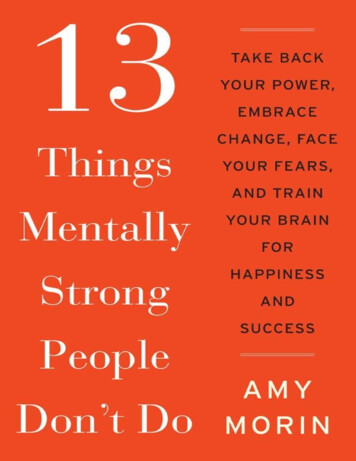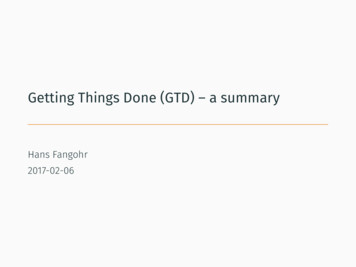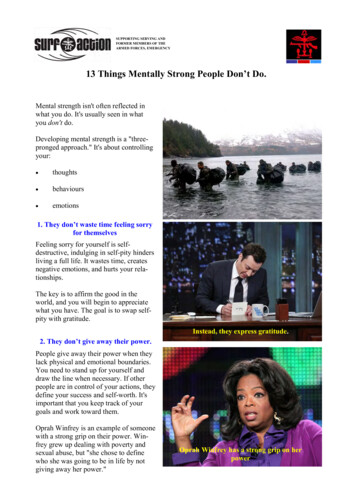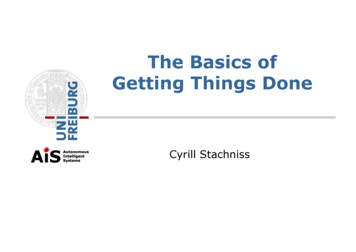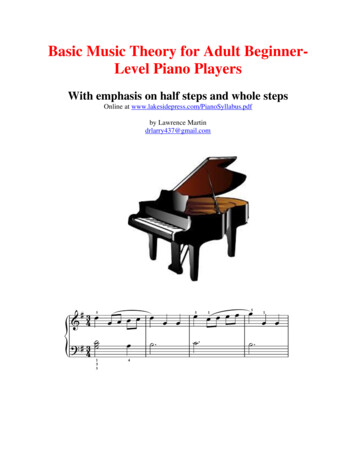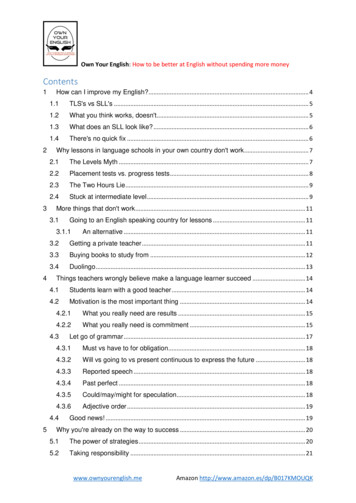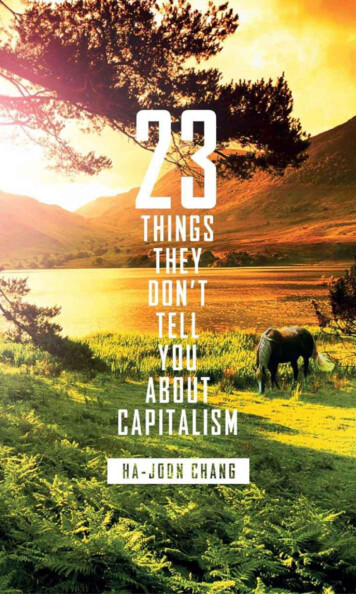
Transcription
23 Things They Don’t TellYou about CapitalismHA-JOON CHANGALLEN LANEan imprint ofPENGUIN BOOKS
ALLEN LANEPublished by the Penguin GroupPenguin Books Ltd, 80 Strand, London WC2R 0RL, EnglandPenguin Group (USA) Inc., 375 Hudson Street, New York,New York 10014, USAPenguin Group (Canada), 90 Eglinton Avenue East, Suite700, Toronto, Ontario, Canada M4P 2Y3 (a division ofPearson Canada Inc.)Penguin Ireland, 25 St Stephen’s Green, Dublin 2, Ireland (adivision of Penguin Books Ltd)Penguin Group (Australia), 250 Camberwell Road,Camberwell, Victoria 3124, Australia (a division of PearsonAustralia Group Pty Ltd)Penguin Books India Pvt Ltd, 11 Community Centre,Panchsheel Park, New Dehli – 110 017, IndiaPenguin Group (NZ), 67 Apollo Drive, North Shore 0632,New Zealand (a division of Pearson New Zealand Ltd)Penguin Books (South Africa) (Pty) Ltd, 24 Sturdee Avenue,Rosebank 2196, South AfricaPenguin Books Ltd, Registered Offices: 80 Strand, LondonWC2R 0RL, Englandwww.penguin.comFirst published 2010Copyright Ha-Joon Chang, 2010The moral right of the author has been assertedAll rights reserved.Without limiting the rights under copyright reserved above,no part of this publication may be reproduced, stored in orintroduced into a retrieval system, or transmitted, in any formor by any means (electronic, mechanical, photocopying,recording or otherwise) without the prior written permission
of both the copyright owner and the above publisher of thisbookISBN: 978-0-141-95786-9
To Hee-Jeong, Yuna, and Jin-Gyu
7 Ways to Read 23 Things TheyDon’t Tell You about CapitalismWay 1. If you are not even sure what capitalism is,read:Things 1, 2, 5, 8, 13, 16, 19, 20, and 22Way 2. If you think politics is a waste of time, read:Things 1, 5, 7, 12, 16, 18, 19, 21, and 23Way 3. If you have been wondering why your life doesnot seem to get better despite ever-rising income andever-advancing technologies, read:Things 2, 4, 6, 8, 9, 10, 17, 18, and 22Way 4. If you think some people are richer than othersbecause they are more capable, better educated andmore enterprising, read:Things 3, 10, 13, 14, 15, 16, 17, 20, and 21Way 5. If you want to know why poor countries arepoor and how they can become richer, read:Things 3, 6, 7, 8, 9, 10, 11, 12, 15, 17, and 23Way 6. If you think the world is an unfair place butthere is nothing much you can do about it, read:Things 1, 2, 3, 4, 5, 11, 13, 14, 15, 20, and 21Way 7. Read the whole thing in the following order
ContentsAcknowledgementsIntroductionThing 1Thing 2Thing 3Thing 4Thing 5Thing 6Thing 7Thing 8Thing 9Thing 10Thing 11Thing 12Thing 13Thing 14Thing 15Thing 16Thing 17Thing 18There is no such thing as a free marketCompanies should not be run in the interestof their ownersMost people in rich countries are paid morethan they should beThe washing machine has changed the worldmore than the internet hasAssume the worst about people and you getthe worstGreater macroeconomic stability has nomade the world economy more stable.Free-market policies rarely make poorcountries richCapital has a nationalityWe do not live in a post-industrial ageThe US does not have the highest livingstandard in the worldAfrica is not destined for underdevelopmentGovernments can pick winnersMaking rich people richer doesn’t make therest of us richerUS managers are over-pricedPeople in poor countries are moreentrepreneurial than people in rich countriesWe are not smart enough to leave things tothe marketMore education in itself is not going tomake a country richerWhat is good for General Motors is not
Thing 19Thing 20Thing 21Thing 22Thing 23necessarily good for the United StatesDespite the fall of communism, we are stillliving in planned economiesEquality of opportunity may not be fairBig government makes people more opento changeFinancial markets need to become less, notmore, efficientGood economic policy does not requiregood economistsConclusion: How to rebuild the world economyNotesIndex
AcknowledgementsI have benefited from many people in writing this book.Having played such a pivotal role in bringing about myprevious book, Bad Samaritans, which focused on thedeveloping world, Ivan Mulcahy, my literary agent, gave meconstant encouragement to write another book with abroader appeal. Peter Ginna, my editor at Bloomsbury USA,not only provided valuable editorial feedback but also playeda crucial role in setting the tone of the book by coming upwith the title, 23 Things They Don’t Tell You aboutCapitalism, while I was conceptualizing the book. WilliamGoodlad, my editor at Allen Lane, took the lead in theeditorial work and did a superb job in getting everything justright.Many people read chapters of the book and providedhelpful comments. Duncan Green read all the chapters andgave me very useful advice, both content-wise andeditorially. Geoff Harcourt and Deepak Nayyar read many ofthe chapters and provided sagacious advice. Dirk Bezemer,Chris Cramer, Shailaja Fennell, Patrick Imam, DeborahJohnston, Amy Klatzkin, Barry Lynn, Kenia Parsons, andBob Rowthorn read various chapters and gave me valuablecomments.Without the help of my capable research assistants, Icould not have got all the detailed information on which thebook is built. I thank, in alphabetical order, BhargavAdhvaryu, Hassan Akram, Antonio Andreoni, YurendraBasnett, Muhammad Irfan, Veerayooth Kanchoochat, andFrancesca Reinhardt, for their assistance.I also would like to thank Seung-il Jeong and Buhm Leefor providing me with data that are not easily accessible.Last but not least, I thank my family, without whose
support and love the book would not have been finished.Hee-Jeong, my wife, not only gave me strong emotionalsupport while I was writing the book but also read all thechapters and helped me formulate my arguments in a morecoherent and user-friendly way. I was extremely pleased tosee that, when I floated some of my ideas to Yuna, mydaughter, she responded with a surprising intellectualmaturity for a 14-year-old. Jin-Gyu, my son, gave me somevery interesting ideas as well as a lot of moral support for thebook. I dedicate this book to the three of them.
IntroductionThe global economy lies in tatters. While fiscal and monetarystimulus of unprecedented scale has prevented the financialmeltdown of 2008 from turning into a total collapse of theglobal economy, the 2008 global crash still remains thesecond-largest economic crisis in history, after the GreatDepression. At the time of writing (March 2010), even assome people declare the end of the recession, a sustainedrecovery is by no means certain. In the absence of financialreforms, loose monetary and fiscal policies have led to newfinancial bubbles, while the real economy is starved ofmoney. If these bubbles burst, the global economy could fallinto another (‘double-dip’) recession. Even if the recovery issustained, the aftermath of the crisis will be felt for years. Itmay be several years before the corporate and thehousehold sectors rebuild their balance sheets. The hugebudget deficits created by the crisis will force governmentsto reduce public investments and welfare entitlementssignificantly, negatively affecting economic growth, povertyand social stability – possibly for decades. Some of thosewho lost their jobs and houses during the crisis may neverjoin the economic mainstream again. These are frighteningprospects.This catastrophe has ultimately been created by the freemarket ideology that has ruled the world since the 1980s.We have been told that, if left alone, markets will produce themost efficient and just outcome. Efficient, becauseindividuals know best how to utilize the resources theycommand, and just, because the competitive marketprocess ensures that individuals are rewarded according totheir productivity. We have been told that business should begiven maximum freedom. Firms, being closest to the
market, know what is best for their businesses. If we let themdo what they want, wealth creation will be maximized,benefiting the rest of society as well. We were told thatgovernment intervention in the markets would only reducetheir efficiency. Government intervention is often designed tolimit the very scope of wealth creation for misguidedegalitarian reasons. Even when it is not, governmentscannot improve on market outcomes, as they have neitherthe necessary information nor the incentives to make goodbusiness decisions. In sum, we were told to put all our trustin the market and get out of its way.Following this advice, most countries have introducedfree-market policies over the last three decades –privatization of state-owned industrial and financial firms,deregulation of finance and industry, liberalization ofinternational trade and investment, and reduction in incometaxes and welfare payments. These policies, their advocatesadmitted, may temporarily create some problems, such asrising inequality, but ultimately they will make everyone betteroff by creating a more dynamic and wealthier society. Therising tide lifts all boats together, was the metaphor.The result of these policies has been the polar oppositeof what was promised. Forget for a moment the financialmeltdown, which will scar the world for decades to come.Prior to that, and unbeknown to most people, free-marketpolicies had resulted in slower growth, rising inequality andheightened instability in most countries. In many richcountries, these problems were masked by huge creditexpansion; thus the fact that US wages had remainedstagnant and working hours increased since the 1970s wasconveniently fogged over by the heady brew of credit-fuelledconsumer boom. The problems were bad enough in the richcountries, but they were even more serious for thedeveloping world. Living standards in Sub-Saharan Africahave stagnated for the last three decades, while LatinAmerica has seen its per capita growth rate fall by two-thirdsduring the period. There were some developing countries
that grew fast (although with rapidly rising inequality) duringthis period, such as China and India, but these are preciselythe countries that, while partially liberalizing, have refused tointroduce full-blown free-market policies.Thus, what we were told by the free-marketeers – or, asthey are often called, neo-liberal economists – was at bestonly partially true and at worst plain wrong. As I will showthroughout this book, the ‘truths’ peddled by free-marketideologues are based on lazy assumptions and blinkeredvisions, if not necessarily self-serving notions. My aim in thisbook is to tell you some essential truths about capitalismthat the free-marketeers won’t.This book is not an anti-capitalist manifesto. Beingcritical of free-market ideology is not the same as beingagainst capitalism. Despite its problems and limitations, Ibelieve that capitalism is still the best economic system thathumanity has invented. My criticism is of a particular versionof capitalism that has dominated the world in the last threedecades, that is, free-market capitalism. This is not the onlyway to run capitalism, and certainly not the best, as therecord of the last three decades shows. The book showsthat there are ways in which capitalism should, and can, bemade better.Even though the 2008 crisis has made us seriouslyquestion the way in which our economies are run, most of usdo not pursue such questions because we think that they areones for the experts. Indeed they are – at one level. Theprecise answers do require knowledge on many technicalissues, many of them so complicated that the expertsthemselves disagree on them. It is then natural that most ofus simply do not have the time or the necessary training tolearn all the technical details before we can pronounce ourjudgements on the effectiveness of TARP (Troubled AssetRelief Program), the necessity of G20, the wisdom of banknationalization or the appropriate levels of executivesalaries. And when it comes to things like poverty in Africa,the workings of the World Trade Organization, or the capital
adequacy rules of the Bank for International Settlements,most of us are frankly lost.However, it is not necessary for us to understand all thetechnical details in order to understand what is going on inthe world and exercise what I call an ‘active economiccitizenship’ to demand the right courses of action from thosein decision-making positions. After all, we make judgementsabout all sorts of other issues despite lacking technicalexpertise. We don’t need to be expert epidemiologists inorder to know that there should be hygiene standards in foodfactories, butchers and restaurants. Making judgementsabout economics is no different: once you know the keyprinciples and basic facts, you can make some robustjudgements without knowing the technical details. The onlyprerequisite is that you are willing to remove those rosetinted glasses that neo-liberal ideologies like you to wearevery day. The glasses make the world look simple andpretty. But lift them off and stare at the clear harsh light ofreality.Once you know that there is really no such thing as a freemarket, you won’t be deceived by people who denounce aregulation on the grounds that it makes the market ‘unfree’(see Thing 1). When you learn that large and activegovernments can promote, rather than dampen, economicdynamism, you will see that the widespread distrust ofgovernment is unwarranted (see Things 12 and 21).Knowing that we do not live in a post-industrial knowledgeeconomy will make you question the wisdom of neglecting,or even implicitly welcoming, industrial decline of a country,as some governments have done (see Things 9 and 17).Once you realize that trickle-down economics does notwork, you will see the excessive tax cuts for the rich for whatthey are – a simple upward redistribution of income, ratherthan a way to make all of us richer, as we were told (seeThings 13 and 20).What has happened to the world economy was noaccident or the outcome of an irresistible force of history. It
is not because of some iron law of the market that wageshave been stagnating and working hours rising for mostAmericans, while the top managers and bankers vastlyincreased their incomes (see Things 10 and 14). It is notsimply because of unstoppable progress in the technologiesof communications and transportation that we are exposedto increasing forces of international competition and have toworry about job security (see Things 4 and 6). It was notinevitable that the financial sector got more and moredetached from the real economy in the last three decades,ultimately creating the economic catastrophe we are intoday (see Things 18 and 22). It is not mainly because ofsome unalterable structural factors – tropical climate,unfortunate location, or bad culture – that poor countries arepoor (see Things 7 and 11).Human decisions, especially decisions by those whohave the power to set the rules, make things happen in theway they happen, as I will explain. Even though no singledecision-maker can be sure that her actions will always leadto the desired results, the decisions that have been madeare not in some sense inevitable. We do not live in the bestof all possible worlds. If different decisions had been taken,the world would have been a different place. Given this, weneed to ask whether the decisions that the rich and thepowerful take are based on sound reasoning and robustevidence. Only when we do that can we demand rightactions from corporations, governments and internationalorganizations. Without our active economic citizenship, wewill always be the victims of people who have greater abilityto make decisions, who tell us that things happen becausethey have to and therefore that there is nothing we can do toalter them, however unpleasant and unjust they may appear.This book is intended to equip the reader with anunderstanding of how capitalism really works and how it canbe made to work better. It is, however, not an ‘economics fordummies’. It is attempting to be both far less and far more.It is less than economics for dummies because I do not
go into many of the technical details that even a basicintroductory book on economics would be compelled toexplain. However, this neglect of technical details is notbecause I believe them to be beyond my readers. 95 percent of economics is common sense made complicated,and even for the remaining 5 per cent, the essentialreasoning, if not all the technical details, can be explained inplain terms. It is simply because I believe that the best wayto learn economic principles is by using them to understandproblems that interest the reader the most. Therefore, Iintroduce technical details only when they become relevant,rather than in a systematic, textbook-like manner.But while completely accessible to non-specialistreaders, this book is a lot more than economics fordummies. Indeed, it goes much deeper than many advancedeconomics books in the sense that it questions manyreceived economic theories and empirical facts that thosebooks take for granted. While it may sound daunting for anon-specialist reader to be asked to question theories thatare supported by the ‘experts’ and to suspect empirical factsthat are accepted by most professionals in the field, you willfind that this is actually a lot easier than it sounds, once youstop assuming that what most experts believe must be right.Most of the issues I discuss in the book do not havesimple answers. Indeed, in many cases, my main point isthat there is no simple answer, unlike what free-marketeconomists want you to believe. However, unless weconfront these issues, we will not perceive how the worldreally works. And unless we understand that, we won’t beable to defend our own interests, not to speak of doinggreater good as active economic citizens.
Thing 1
There is no such thing as afree marketWhat they tell youMarkets need to be free. When the government interferes todictate what market participants can or cannot do,resources cannot flow to their most efficient use. If peoplecannot do the things that they find most profitable, they losethe incentive to invest and innovate. Thus, if the governmentputs a cap on house rents, landlords lose the incentive tomaintain their properties or build new ones. Or, if thegovernment restricts the kinds of financial products that canbe sold, two contracting parties that may both havebenefited from innovative transactions that fulfil theiridiosyncratic needs cannot reap the potential gains of freecontract. People must be left ‘free to choose’, as the title offree-market visionary Milton Friedman’s famous book goes.What they don’t tell youThe free market doesn’t exist. Every market has some rulesand boundaries that restrict freedom of choice. A marketlooks free only because we so unconditionally accept itsunderlying restrictions that we fail to see them. How ‘free’ amarket is cannot be objectively defined. It is a political
definition. The usual claim by free-market economists thatthey are trying to defend the market from politicallymotivated interference by the government is false.Government is always involved and those free-marketeersare as politically motivated as anyone. Overcoming the myththat there is such a thing as an objectively defined ‘freemarket’ is the first step towards understanding capitalism.Labour ought to be freeIn 1819 new legislation to regulate child labour, the CottonFactories Regulation Act, was tabled in the BritishParliament. The proposed regulation was incredibly ‘lighttouch’ by modern standards. It would ban the employment ofyoung children – that is, those under the age of nine. Olderchildren (aged between ten and sixteen) would still beallowed to work, but with their working hours restricted totwelve per day (yes, they were really going soft on thosekids). The new rules applied only to cotton factories, whichwere recognized to be exceptionally hazardous to workers’health.The proposal caused huge controversy. Opponents saw itas undermining the sanctity of freedom of contract and thusdestroying the very foundation of the free market. In debatingthis legislation, some members of the House of Lordsobjected to it on the grounds that ‘labour ought to be free’.Their argument said: the children want (and need) to work,and the factory owners want to employ them; what is theproblem?Today, even the most ardent free-market proponents inBritain or other rich countries would not think of bringingchild labour back as part of the market liberalizationpackage that they so want. However, until the late nineteenthor the early twentieth century, when the first serious child
labour regulations were introduced in Europe and NorthAmerica, many respectable people judged child labourregulation to be against the principles of the free market.Thus seen, the ‘freedom’ of a market is, like beauty, in theeyes of the beholder. If you believe that the right of childrennot to have to work is more important than the right of factoryowners to be able to hire whoever they find most profitable,you will not see a ban on child labour as an infringement onthe freedom of the labour market. If you believe the opposite,you will see an ‘unfree’ market, shackled by a misguidedgovernment regulation.We don’t have to go back two centuries to seeregulations we take for granted (and accept as the ‘ambientnoise’ within the free market) that were seriously challengedas undermining the free market, when first introduced. Whenenvironmental regulations (e.g., regulations on car andfactory emissions) appeared a few decades ago, they wereopposed by many as serious infringements on our freedomto choose. Their opponents asked: if people want to drive inmore polluting cars or if factories find more pollutingproduction methods more profitable, why should thegovernment prevent them from making such choices?Today, most people accept these regulations as ‘natural’.They believe that actions that harm others, howeverunintentionally (such as pollution), need to be restricted.They also understand that it is sensible to make careful useof our energy resources, when many of them are nonrenewable. They may believe that reducing human impact onclimate change makes sense too.If the same market can be perceived to have varyingdegrees of freedom by different people, there is really noobjective way to define how free that market is. In otherwords, the free market is an illusion. If some markets lookfree, it is only because we so totally accept the regulationsthat are propping them up that they become invisible.
Piano wires and kungfu mastersLike many people, as a child I was fascinated by all thosegravity-defying kungfu masters in Hong Kong movies. Likemany kids, I suspect, I was bitterly disappointed when Ilearned that those masters were actually hanging on pianowires.The free market is a bit like that. We accept thelegitimacy of certain regulations so totally that we don’t seethem. More carefully examined, markets are revealed to bepropped up by rules – and many of them.To begin with, there is a huge range of restrictions onwhat can be traded; and not just bans on ‘obvious’ thingssuch as narcotic drugs or human organs. Electoral votes,government jobs and legal decisions are not for sale, atleast openly, in modern economies, although they were inmost countries in the past. University places may not usuallybe sold, although in some nations money can buy them –either through (illegally) paying the selectors or (legally)donating money to the university. Many countries ban tradingin firearms or alcohol. Usually medicines have to be explicitlylicensed by the government, upon the proof of their safety,before they can be marketed. All these regulations arepotentially controversial – just as the ban on selling humanbeings (the slave trade) was one and a half centuries ago.There are also restrictions on who can participate inmarkets. Child labour regulation now bans the entry ofchildren into the labour market. Licences are required forprofessions that have significant impacts on human life, suchas medical doctors or lawyers (which may sometimes beissued by professional associations rather than by thegovernment). Many countries allow only companies withmore than a certain amount of capital to set up banks. Eventhe stock market, whose under-regulation has been a causeof the 2008 global recession, has regulations on who can
trade. You can’t just turn up in the New York Stock Exchange(NYSE) with a bag of shares and sell them. Companiesmust fulfil listing requirements, meeting stringent auditingstandards over a certain number of years, before they canoffer their shares for trading. Trading of shares is onlyconducted by licensed brokers and traders.Conditions of trade are specified too. One of the thingsthat surprised me when I first moved to Britain in the mid1980s was that one could demand a full refund for a productone didn’t like, even if it wasn’t faulty. At the time, you justcouldn’t do that in Korea, except in the most exclusivedepartment stores. In Britain, the consumer’s right to changeher mind was considered more important than the right ofthe seller to avoid the cost involved in returning unwanted(yet functional) products to the manufacturer. There are manyother rules regulating various aspects of the exchangeprocess: product liability, failure in delivery, loan default, andso on. In many countries, there are also necessarypermissions for the location of sales outlets – such asrestrictions on street-vending or zoning laws that bancommercial activities in residential areas.Then there are price regulations. I am not talking here justabout those highly visible phenomena such as rent controlsor minimum wages that free-market economists love to hate.Wages in rich countries are determined more byimmigration control than anything else, including anyminimum wage legislation. How is the immigrationmaximum determined? Not by the ‘free’ labour market,which, if left alone, will end up replacing 80–90 per cent ofnative workers with cheaper, and often more productive,immigrants. Immigration is largely settled by politics. So, ifyou have any residual doubt about the massive role that thegovernment plays in the economy’s free market, then pauseto reflect that all our wages are, at root, politicallydetermined (see Thing 3).Following the 2008 financial crisis, the prices of loans (ifyou can get one or if you already have a variable rate loan)
have become a lot lower in many countries thanks to thecontinuous slashing of interest rates. Was that becausesuddenly people didn’t want loans and the banks needed tolower their prices to shift them? No, it was the result ofpolitical decisions to boost demand by cutting interest rates.Even in normal times, interest rates are set in most countriesby the central bank, which means that politicalconsiderations creep in. In other words, interest rates arealso determined by politics.If wages and interest rates are (to a significant extent)politically determined, then all the other prices are politicallydetermined, as they affect all other prices.Is free trade fair?We see a regulation when we don’t endorse the moralvalues behind it. The nineteenth-century high-tariff restrictionon free trade by the US federal government outraged slaveowners, who at the same time saw nothing wrong withtrading people in a free market. To those who believed thatpeople can be owned, banning trade in slaves wasobjectionable in the same way as restricting trade inmanufactured goods. Korean shopkeepers of the 1980swould probably have thought the requirement for‘unconditional return’ to be an unfairly burdensomegovernment regulation restricting market freedom.This clash of values also lies behind the contemporarydebate on free trade vs. fair trade. Many Americans believethat China is engaged in international trade that may be freebut is not fair. In their view, by paying workers unacceptablylow wages and making them work in inhumane conditions,China competes unfairly. The Chinese, in turn, can ripostethat it is unacceptable that rich countries, while advocatingfree trade, try to impose artificial barriers to China’s exports
by attempting to restrict the import of ‘sweatshop’ products.They find it unjust to be prevented from exploiting the onlyresource they have in greatest abundance – cheap labour.Of course, the difficulty here is that there is no objectiveway to define ‘unacceptably low wages’ or ‘inhumaneworking conditions’. With the huge international gaps thatexist in the level of economic development and livingstandards, it is natural that what is a starvation wage in theUS is a handsome wage in China (the average being 10 percent that of the US) and a fortune in India (the average being2 per cent that of the US). Indeed, most fair-trade-mindedAmericans would not have bought things made by their owngrandfathers, who worked extremely long hours underinhumane conditions. Until the beginning of the twentiethcentury, the average work week in the US was around sixtyhours. At the time (in 1905, to be more precise), it was acountry in which the Supreme Court declaredunconstitutional a New York state law limiting the workingdays of bakers to ten hours, on the grounds that it ‘deprivedthe baker of the liberty of working as long as he wished’.Thus seen, the debate about fair trade is essentiallyabout moral values and political decisions, and noteconomics in the usual sense. Even though it is about aneconomic issue, it is not something economists with theirtechnical tool kits are particularly well equipped to rule on.All this does not mean that we need to take a relativistposition and fail to criticize anyone because anything goes.We can (and I do) have a view on the acceptability ofprevailing labour standards in China (or any other country,for that matter) and try to do something about it, withoutbelieving that those who have a different view are wrong insome absolute sense. Even though China cannot a
Thing 5 Assume the worst about people and you get the worst Thing 6 Greater macroeconomic stability has no made the world economy more stable. Thing 7 Free-market policies rarely make poor countries rich Thing 8 Capital has a nationality Thing 9 We do not live in a post-industrial age
